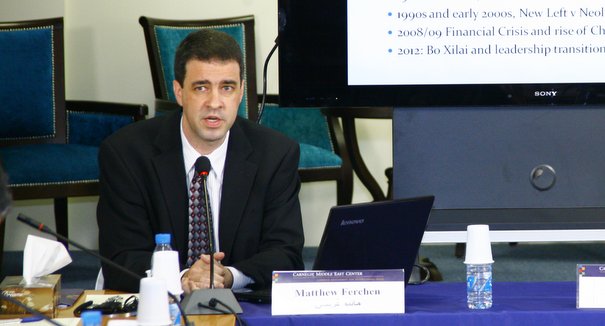 In the modern era, political leaders and scholars have declared the rule of law to be essential to democracy, a necessity for economic growth, and a crucial tool in the fight for security at home and stability abroad. The United States has spent billions attempting to catalyze rule-of-law improvements within other countries. Yet despite the importance and the hard work of hundreds of practitioners on the ground, the track record of rule-of-law promotion has been paltry.
In the modern era, political leaders and scholars have declared the rule of law to be essential to democracy, a necessity for economic growth, and a crucial tool in the fight for security at home and stability abroad. The United States has spent billions attempting to catalyze rule-of-law improvements within other countries. Yet despite the importance and the hard work of hundreds of practitioners on the ground, the track record of rule-of-law promotion has been paltry.
In Advancing the Rule of Law Abroad, Rachel Kleinfeld describes the history and current state of reform efforts and the growing movement of second-generation reformers who view the rule of law not as a collection of institutions and laws that can be built by outsiders, but as a relationship between the state and society that must be shaped by those inside the country. Based on research in countries from Indonesia to Albania, Kleinfeld makes a compelling case for new methods of reform that can have greater chances of success at helping these internal reformers and improving the rule of law.
“Rachel Kleinfeld not only assesses past efforts to support the rule of law abroad, but offers innovative approaches for future assistance. The work of scholars and practitioners alike will benefit measurably from her insights.”
—Kenneth Wollack, President, National Democratic Institute
“While policymakers increasingly recognize the risks to U.S. national security when the rule of law breaks down abroad, there is far less consensus on what to do about it. Advancing the Rule of Law Abroad tackles this question head-on with timely and powerful insight. Full of careful analysis and accessible prose, Kleinfeld brings conceptual clarity to an emerging field.”
—Jeremy Weinstein, Stanford University, Former Director for Development and Democracy, National Security Council
“This book is impressive, thoughtful, and full of practical wisdom. Kleinfeld analyzes many of the challenges we faced in helping civilian rule-of-law development experts in Iraq and Afghanistan. This should be on the reading list of anyone preparing to perform rule-of-law work in a post-conflict setting.”
—Brigadier General Mark Martins, U.S. Army
 Hezbollah’s hard power has not yet been affected by developments in the Arab Spring or Syria, but a new regional power order and shifting public opinion prioritizing civil rights and democracy could severely weaken the movement's hold on power.
Hezbollah’s hard power has not yet been affected by developments in the Arab Spring or Syria, but a new regional power order and shifting public opinion prioritizing civil rights and democracy could severely weaken the movement's hold on power.

 Nearly ten years after the question of Iran’s nuclear ambitions became an international issue, little progress has been made in settling it.
Nearly ten years after the question of Iran’s nuclear ambitions became an international issue, little progress has been made in settling it.
 If United States and Russia fail to collaborate on urgent global issues, it could enhance the two countries’ mutual alienation, allow regional crises to run unabated, and even lead to a reconfiguration of the world’s strategic landscape.
If United States and Russia fail to collaborate on urgent global issues, it could enhance the two countries’ mutual alienation, allow regional crises to run unabated, and even lead to a reconfiguration of the world’s strategic landscape.
Sign up for Carnegie announcements and publications—including Carnegie This Week—by filling out the form below. Note—fields marked with an asterisk (*) are required.
Enter your email address in the form below to receive an email with a link to your profile.